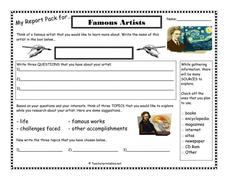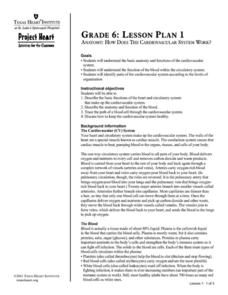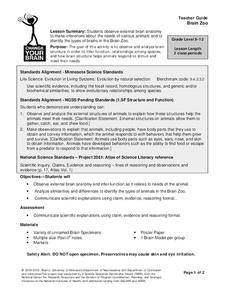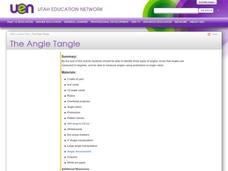Overcoming Obstacles
Using Appropriate Resources
A lesson dives deep into reference materials. The class begins with a discussion of which resources are best used for specific purposes and how to identify ways to get the needed information. Learners share information about the internet...
Curated OER
Reference Materials
3rd graders will learn how to use four types of reference materials (Atlas, Encyclopedia, Dictionary, Thesaurus). Each slide includes the purpose for using that specific reference. There are challenge questions included that give mock...
Teacher Printables
My Report Pack for... Famous Artists
Famous artists are fascinating, and learners will explore one of their choice using this report pack. Working their way through this template, they write three questions about the artist they are researching, check off types of reference...
Virginia Department of Education
Three Types of Rocks
Rock out with the second installment of a five-part series on earth materials and processes. Your budding geologists make observations of given rock samples and posit classification systems for rocks. They then learn about the accepted...
Curated OER
ABO Blood Types Worksheet
Blood types and transfusions are explained in reading passages at the top of the instructional activity. A chart of blood type compatibility is also provided. Biology students answer comprehension questions and then exercise...
Texas Heart Institute
Anatomy: How Does the Cardiovascular System Work?
How can the circulatory system compare to a city map? Pupils distinguish the "roadways" and "vehicles" of the cardiovascular system, compare the anatomy and function of veins and arteries, and review different types of blood cells with...
Geography 360°
Poetry Writing
Put the tips and tricks in this guide into practice in order to encourage your pupils to blossom into poets. A wonderful reference material for teachers, this packet includes definitions of poetic terms and forms as well as step-by-step...
Curated OER
DNA AND BLOOD TYPING
Learners list three descriptive characteristics and three functions of DNA, describe two ways that genetics is important in a forensic investigation, and list the four major human blood types.
Hood River County School District
Text Structure: Features and Organization
Teach learners how to interact with both fiction and non-fiction text with a packet of activities and worksheets. After looking over text structure and the difference in text features between different types of writing, readers analyze...
Curated OER
Regents High School Examination: Physical Setting Earth Science 2006
Test your class on earth science with this extensive resource. This test, created by The University of the State of New York Regents, is made up of 50 multiple choice questions and 32 short answer questions that cover the branches of...
Curated OER
Combining Clouds and Art in the Classroom
Get your head in the clouds before teaching cloud types to your mini-meteorologists. The lesson opens with a beautiful PowerPoint presentation of clouds portrayed in different artists' paintings. After viewing artistic renditions,...
Southwest Educational Development Laboratory
Simple Machines
Simple doesn't mean useless. Individuals learn how simple machines benefit the user by changing the amount of effort. A seven-lesson unit begins with an overview of simple machines and then incorporates activities that allow the user to...
Curated OER
100 Questions
Gather around to play a game! Middle and high schoolers answer questions (provided here) using various reference materials. Bring encyclopedias and other reference materials to class, as each group has limited Internet access! An answer...
International Reading Association
Children’s Choices 2014
Books for kids, chosen by kids! What could be better? This packet is made up of book lists, each with approximately 30 books included, organized by age group. Kids will enjoy the summer reading materials they choose from this resource!
Name Parts of a Computer and Terms for Interface Elements
Familiarize your young learners with the parts of a computer and some basic key terms relating to technology. As the teacher demonstrates using an LCD projector, class members practice moving a mouse, opening the Internet, typing in a...
University of Minnesota
Brain Zoo
Who doesn't love a day at the zoo? Use an observation and inference lab to get young anatomists to recognize similarities between mammalian species based on brain structures. You provide the brains; this lesson provides set-up...
Scholastic
What's Your Angle?
Identifying types of angles meets real-world application in an excellent, hands-on geometry activity. Learners use pipe cleaners and a visual model to independently discover the acute, right, or obtuse angles in their classroom, which...
Centers for Ocean Sciences
Ocean and Great Lakes Literacy: Principle 1
Is your current lesson plan for salt and freshwater literacy leaving you high and dry? If so, dive into part one of a seven-part series that explores the physical features of Earth's salt and freshwater sources. Junior hydrologists...
Curated OER
Maps
If your students are just starting a unit on Geography this could be the introduction you're looking for. This PowerPoint presents a clear and organized overview of the different types of maps people use and why each is important. Tip:...
Curated OER
Applied Science - Science and Math Pre-Lab 4C
Scholars classify the sciences. Using applied science, they compare and contrast subfields of sciences. They compare qualitative versus quatitative. They discuss types of sciences and the meanings of the word roots of the names.
National Center for Families Learning
The Summer Fun Summer Learning Poetry Unit
Focus on poetry this summer to enhance those comprehension, fluency, and language skills with a set of resources intended to explore different types of poetry, specifically lyric poetry. The daily activities contain differentiation ideas...
Curated OER
Angles
Fourth and fifth graders investigate angles and name them according to the criteria for obtuse, acute, and right angles. They examine a human-made yarn pattern on the floor of their classroom and identify angles, vertices, and types of...
Baruch College Writing Center
Summarizing, Paraphrasing, and Quoting Workshop
What's the difference between summarizing and paraphrasing? Show class members how to find the main ideas from informational text and condense it, restate it, or quote it directly with a series of educational activities based on two...
Nuffield Foundation
Microscale Investigations of Catalase Activity in Plant Extracts
Use indirect measurements to monitor metabolic activity in plant cells. Scholars understand that cells with a higher metabolic rate have a higher concentration of catalase enzyme. They use this information to compare metabolic rates of...

























